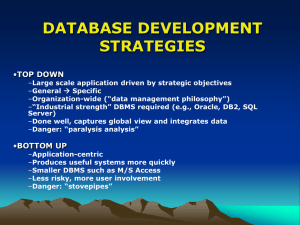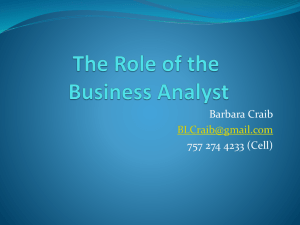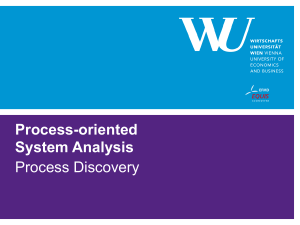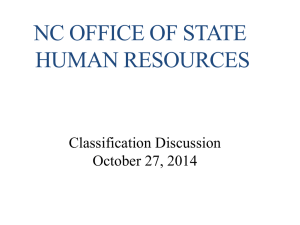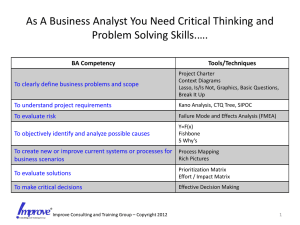Chap 2 Core Ethical Principles
advertisement
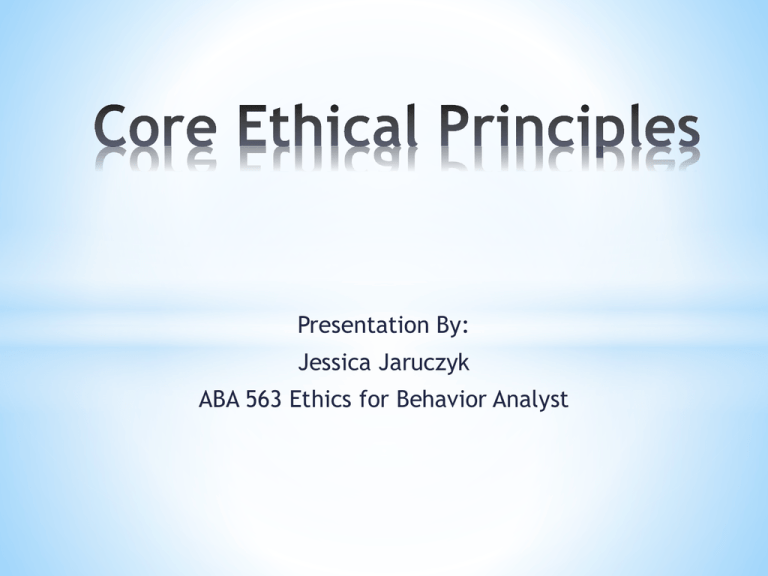
Presentation By: Jessica Jaruczyk ABA 563 Ethics for Behavior Analyst * Ethics comes from the Greek word- Ethos: moral character * Defined by Merrian-Webster as: conforming to accepted professional standards of conduct. * The rules of conduct recognized in respect to a particular class of human actions or a particular group, culture, etc.: medical ethics Christian ethics * 1.0 Responsible Conduct of a Behavior Analyst * 2.0 The Behavior Analyst's Responsibility to Clients * 3.0 Assessing Behavior * 4.0 The Behavior Analyst and the Individual Behavior Change Program * 5.0 The Behavior Analyst as Teacher and/or Supervisor * 6.0 The Behavior Analyst and the Workplace * 7.0 The Behavior Analyst’s Ethical Responsibility to the Field of Behavior Analysis * 8.0 The Behavior Analyst’s Responsibility to Colleagues * 9.0 The Behavior Analyst’s Ethical Responsibility to Society * 10.0 The Behavior Analyst and Research http://www.bacb.com/index.php?page=57 * Koocher and Keith-Spiegel (1998) Outline nine ethical principles for psychologists. * 1. Do No Harm * 2. Respecting Autonomy * 3. Benefiting Others * 4. Being Just * 5. Being Truthful * 6. According Dignity * 7. Treating Others with Care & Compassion * 8. Pursuit of Excellence * 9. Accepting Responsibility * “First, Do No Harm" -attributed to Hippocrates, a Greek physician in the 4th century B.C. * Commonly written as "Do No Harm" - this phrase appears in the Hippocratic oath that is taken by physicians * Areas in which a behavior analyst can do harm is: 1. Practicing outside their area of expertise 2. Not developing a responsible data collection system and missing the significance of a behavior. 3. Not asking for the information necessary to perform ethically. Staff members are not necessarily well versed in human behavior. * Respecting Autonomy- to promote his or her independence or self-sufficiency * Basic procedures of Behavior Analysis are designed to do just this through: Prompting Shaping Chaining Fading Conditioned reinforcers Token economies * Problems arise when it is determined that a person prefers to keep another under his/her control. * Autonomy can also bring risks that are not always foreseen. * Autonomy in educational and business settings can produce ethical issues. Teachers are reinforced by students who stay in their seats and follow instructions. Supervisors may desire that their staff just do what they are told and "follow directions" * The primary role of behavior analysts is to benefit others in whatever setting or situation they may work. * The behavior analyst needs to make frequent checks on "who is the client?" in any given situation. * “The Golden Rule” or the Ethic of Reciprocity * For Behavior Analyst- there is potential for the use of uncomfortable stimuli or stressful contingencies in treatment * Need to Ask: “How would I like my mother or my child to be treated in similar circumstances?” http://www.youtube.com/watch?v=xxoabyEUJas&feature=relat ed * Well-respected professionals attain their reputation based on the trust placed in them by others * Being truthful & honest with clients, colleagues, and administrators provides the basis for long-term relationships * Don’t take credit that is not due to you. * Many of the clients may not be able to effectively represent themselves: Non-verbal Unable to get someone to listen to them * It is the job of the behavior analyst to make sure that every client is treated with dignity and respect * Work with clients on acquisition skills to make sure that they are able to voice or signal their needs to those around them * Being mindful of the language we use to talk to or about clients * Clients should be addresses by name in a friendly fashion using eye-contact and a pleasant smile. http://www.youtube.com/watch?v=b2Gr8ECc8gw&feature=re lated * As a behavior analyst if you respect the autonomy of clients, work to benefit them, and devise programs that accord them dignity, you will automatically be treating them with dignity and respect. * Being aware of the latest research in the field and in your specialty * Incorporating the most up to date methods and procedures in your practice of behavior analysis * Subscribe to key journals in the field * Attend your state association meeting / ABAI * Watch for specialty workshops offered in your area * Take graduate seminars * The BCBA requires BCBA’s to acquire continuing education hours each year * When treatments fail you must take responsibility, accepting blame and make corrections to satisfy your client * Behavior analysts do not begin their ethical training school in graduate * Developmental psychologists would argue that one’s ethical standards are fairly set by the time a child ventures into junior high school * Personal ethical situations confront people everyday * Need for Code of Responsible Conduct * It is the hope that behavior analyst will come to see the value in adopting a set of responsible behaviors that will advance the profession and provide respect to this important new field of psychology http://www.youtube.com/watch?v=0yn4SBNSkg4&list= PL97C7BAB934132514&index=2&feature=plpp_video * Scenario # 1 – Respecting Autonomy * Scenario # 2 – Being Just * Scenario # 3 – Do No Harm * Scenario # 4 – Benefiting Others * Scenario # 5 – Being Truthful * Scenario # 6 – Treating Others with Caring * Scenario # 7 – According Dignity * Scenario # 8 – Accepting Responsibilit * Scenario # 9 – Pursuit of Excellence & Compassion Bailey, J.S., & Burch, M. R. (2010). Twenty-five essential skills & strategies for the professional behavior analyst. New York: Routledge Publishing. http://www.bacb.com/index.php?page=57 http://www.youtube.com/watch?v=xxoabyEUJas&feature=related http://www.youtube.com/watch?v=b2Gr8ECc8gw&feature=related http://www.youtube.com/watch?v=0yn4SBNSkg4&list=PL97C7BAB93413251 4&index=2&feature=plpp_video


